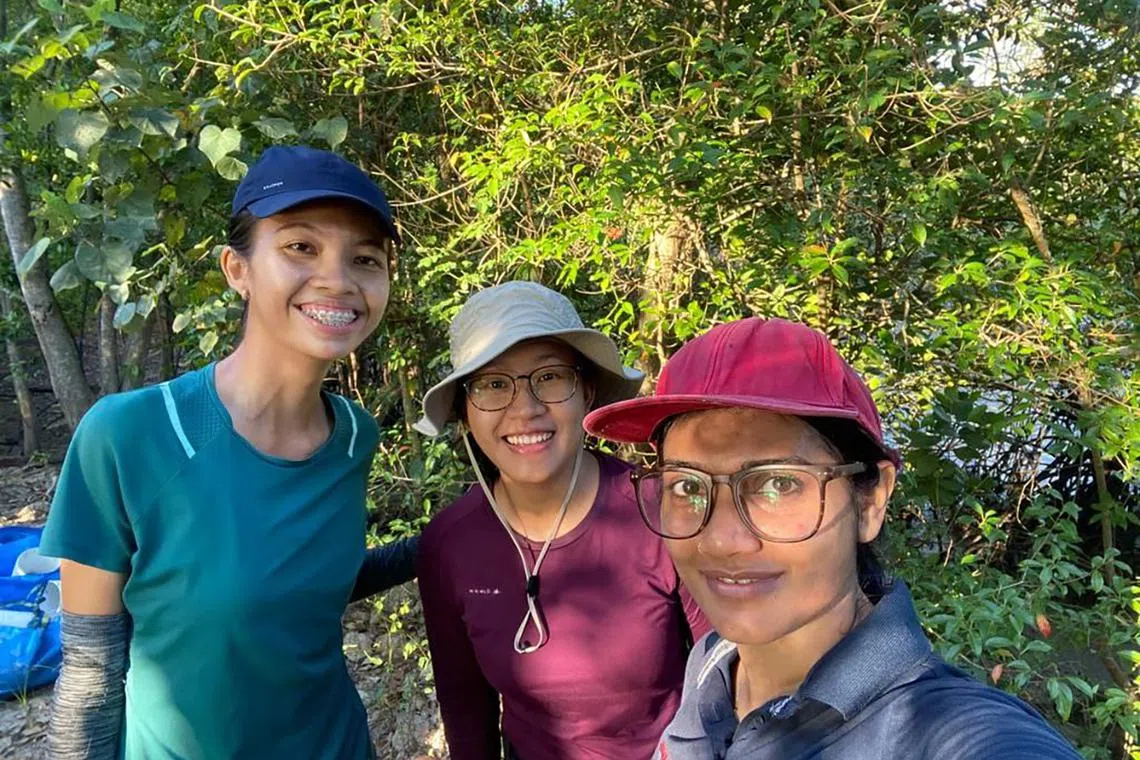NUS researcher wants to find ways to channel more finance into conserving nature
Sign up now: Get ST's newsletters delivered to your inbox

(From left) Jamie Yeo, Shakura Bashir and Naima Iram helping to measure blue carbon at Pulau Ubin as part of volunteering work with NUS CNCS.
PHOTO: COURTESY OF SHAKURA BASHIR
Follow topic:
SINGAPORE – Having spent a decade in the environment sector, Ms Shakura Bashir has seen a whole spectrum of sustainability efforts take shape here, from the Republic’s efforts to bolster food security, to its continued investing in clean water technologies.
But one particular area has since captured the attention of the PhD student – wielding the power of Mother Nature to tackle the twin challenges of climate change and biodiversity loss.
Protecting nature and sustainably managing natural ecosystems, such as forests and mangroves, can be an antidote to the climate crisis, as nature-based solutions help to whittle away carbon dioxide (CO2) from the atmosphere, cleaving the carbon, and storing the element in their soil and root systems.
At the same time, mangroves can protect surrounding communities from harsh climate impacts like sea-level rise,
“Yet, many lush forests and biodiversity-rich areas are being threatened with deforestation, in the face of lucrative businesses like timber and palm oil,” said Ms Shakura, 33, who is pursuing her doctorate at the National University of Singapore’s Centre for Nature-based Climate Solutions.
The issue is particularly pronounced in South-east Asia, which is losing 1.2 per cent of its forests annually for agriculture, food and other raw materials.
To keep these forests intact, local communities would therefore need the financial incentives to do so.
So far, the lion’s share of such efforts has come from government funding worldwide – standing at 76 per cent, based on a Bloomberg New Economy Forum report in April.
This is insufficient to safeguard nature and biodiversity globally, and more private finance would be required to bridge the gap, said Ms Shakura.
According to the report, about US$160 billion (S$216 billion) a year goes into nature conservation and restoration efforts globally, but there is still a wide financing gap of at least US$803 billion annually.
“Yet, many investors are often not as willing to fund nature-based solutions, perhaps because of their risk appetite – many want quicker returns, or feel that they need to see tangible results before deciding to put in their money.
“But investing in nature requires one to play the long game. Think about how long it takes for a sapling to grow into a tree,” she added.
The good news is that interest from investors is growing, and Ms Shakura is currently working on more innovative ways of raising the much-needed finance for nature in the Asia-Pacific region.
One such way is to repurpose environmentally harmful subsidies, like agricultural subsidies, to support green efforts instead. A World Bank report in June found that agricultural subsidies are responsible for the loss of 2.2 million ha of forest per year, or 14 per cent of global deforestation.
Prior to taking up her course, Ms Shakura did an internship at Conservation International Singapore as part of her master’s programme in biodiversity conservation. The stint opened her eyes to the issues that non-governmental organisations often face when it comes to implementing projects on the ground – one of which is the need for early-stage financing.
For instance, to reforest a degraded plot of land, financing is needed to begin planting new trees, followed by the need for tracking and monitoring equipment to measure the amount of CO2 that has been trapped and stored away from the atmosphere.
There is also the human aspect of these nature-based projects, which is to ensure that the livelihoods of indigenous people and local communities are being accounted for, said Ms Shakura.
“For instance, are their knowledge and values being taken into consideration? These people are the custodians of their land, and we must think about how we can effectively empower them.”
Her five-year stint with Temasek’s sustainable solutions team also gave her insights into the business case for nature-climate solutions, and the enabling conditions for investments to be made into such projects.

Shakura conducting intertidal surveys at Changi Beach for her PhD at NUS CNCS.
PHOTO: COURTESY OF SHAKURA BASHIR
Ms Shakura will be attending the United Nations’ climate summit, COP28,
She hopes to track how countries are integrating nature into their climate mitigation strategies, and whether sufficient finance is channelled into nature to see these mitigation goals come to fruition.
Reports have shown that less than 10 per cent of climate finance thus far has gone into nature, she noted.
Countries have also pledged to halt and reverse forest loss by 2030, but there are indications that the world is off-track in achieving this target.
“I hope to track the progress of this goal, and to check if the ambition is still there,” she added.
As to why she decided to take the leap from the private sector to academia in January, Ms Shakura said: “I see myself as playing the long game. Being in academia also allows me to (tackle the nature-financing issue) from a neutral perspective, whereas in the public or private sector, there are certain expectations to meet, be it looking after the economy or ensuring profitability.
“But in academia, you get to integrate the viewpoints of different stakeholders and find innovative ways to address these problems.”
Ms Shakura, who has a bachelor’s degree in environmental engineering, got her start at the Economic Development Board, where she helped to bring cleaner, more energy-efficient water technologies to market.

NUS undergraduates Shakura Nuha Bashir (left) and Muhammad Nadjad Abdul Rahim (second from right) helping out at a paddy field in Laos while on their school’s Univeristy Scholars Programme (USP).
PHOTO: COURTESY OF SHAKURA BASHIR
But her interest in sustainability was inspired by her father, who at the time was working on air quality policy at the National Environment Agency.
“I saw the importance of that, and thought to follow his footsteps,” said Ms Shakura, who initially mulled over reading political science instead.
And what drives her to keep going, especially when the work seems unceasing?
“My young daughter,” said Ms Shakura.
“Just thinking about her future, and the fact that our generation’s actions will determine the kind of world she will live in... That really, really compels me to keep going, and to not give up.”


